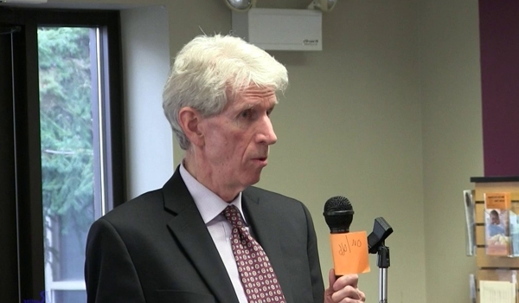Gareth Porter, the award-winning American historian and investigative journalist, says he is proud and happy to have his book “Manufactured Crisis: The Untold Story of the Iran Nuclear Scare” rendered into Persian language and published in Iran as the first foreign language edition.
“I am extremely proud to have my book published in Iran as the first foreign language edition,”Dr. Porter said in an exclusive interview with Fars News Agency.
Gareth Porter is a leading American journalist, historian, anti-war activist and correspondent of the Vietnam War. Porter’s writings have appeared on such publications as The Nation, Inter Press Service, The Huffington Post, Truthout, Al-Jazeera, Press TV, Antiwar.com and Common Dreams. Porter is the 2012 winner of Martha Gellhorn Prize for Journalism, which is awarded annually to a journalist who exposes media propaganda.
Gareth Porter has recently published a book titled “Manufactured Crisis: The Untold Story of the Iran Nuclear Scare” which discloses the unseen and masked truths behind the decade-long standoff over Iran’s nuclear program.
In this book, Porter endeavors to reveal the destructive role Israel has played in the exacerbation of Iran’s relations with the West over the former’s nuclear activities. Porter maintains that Iran’s nuclear program is completely legal and regularly inspected, abused by the United States and Israel as a pretext for pressuring Iran.
Porter was due to arrive in Tehran on Saturday, September 27, to participate in the releasing ceremony of the Persian edition of his book which has been translated by Fars News Agency and will go on display during a launching and signing ceremony at the venue of FNA in Tehran later on Saturday.
Fars News Agency’s Javad Arab Shirazi has conducted an interview with Dr. Porter. What follows is the full text of the interview:
Q. Dr. Porter, what inspired you to author “Manufactured Crisis”?
A. What inspired me was the realization that there was a major story here going to the very core of US national security policy that involved a series of blatant falsehoods. It began with my realization that the “laptop documents” were certainly fraudulent, as indicated by multiple types of evidence. The more deeply I got into the story, the more I realized that it could be covered in a book, not in a series of articles.
Q. The title of your book is “Manufactured Crisis: The Untold Story of the Iran Nuclear Scare”. Would you be kind enough to let us know why you picked up this title for your book?
A. I thought it was important to find a phrase to describe the whole political process that has taken place over the years surrounding the Iranian nuclear case that would be dramatic enough to convey the deceptive nature of the charges of a covert nuclear program as well as the hyping of the “crisis” as involving the threat of war. In essence it conveys the idea that a completely false picture of issue has been foisted on the public.
The “untold” part of the title is also a reflection of the reality that no one else has come anywhere close to telling the real story of the politics surrounding the Iran nuclear issue, and that instead a false narrative has been created and constantly developed further over the years.
Q. The front cover of your book depicts Netanyahu’s cartoon bomb he showed during his UN speech last year. Would you please tell us whether you suggested the image or you were proposed choices?
A. The cartoon bomb picture was my idea, after exploring the possibility of a cover that would have both Netanyahu and Obama on it. No pictures that could be found seemed to convey the essence of the subject matter the way the Netanyahu picture does. It seemed the logical choice.
Q. Dr. Porter, in one of your latest interviews you mentioned, “If we go back in time until the 1990s, the first time the US talked about Iran as a threat for the development of Weapons of Mass Destruction (WMD) and nuclear power was at the end of the Cold War.” Would you please elaborate on this?
A. The end of the Cold War is a key turning point in US policy toward Iran, because the logic of the situation prior to that event was that there would be relaxation of tension between the US and Iran after the freeing of US hostages from Lebanon thanks to Iranian diplomatic intervention. That was indeed the intention of President George H. W. Bush. But instead the conflict was kicked into a higher gear by the bureaucratic interests in the Pentagon and the CIA, who saw the need for a new enemy to replace the Soviet Union and who now saw no need to come to terms with Iran in the regional context, because they perceived the United States as now the unipolar hegemon with unchallenged power. I view the origin of the charge of an Iranian desire for nuclear weapons as emerging out of those two closely linked consequences of the end of the Cold War.
